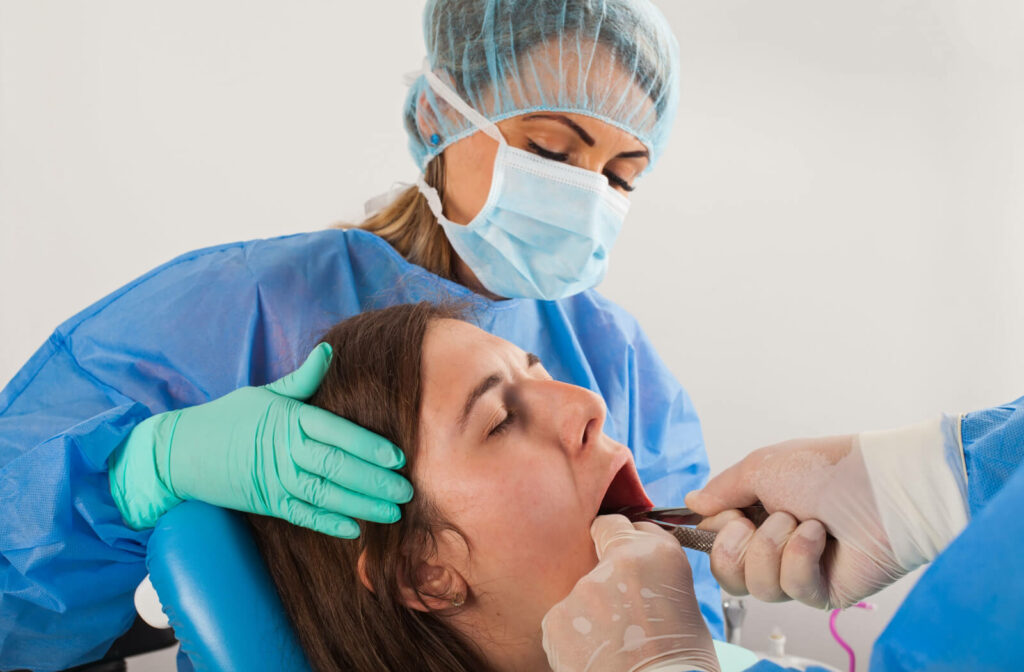Wisdom teeth removal is a routine oral surgery. Most procedures are preventative to avoid problems as the teeth move and break through the gums. As wisdom teeth grow, they rarely emerge straight and upright, and removing them early prevents gum issues, impacted teeth, jaw problems, and tooth decay.
At your regular cleaning, your dentist will look at your x-rays to monitor the growth of your wisdom teeth to help determine if removing them is necessary for your oral health.
What is Wisdom Tooth Removal?
Your wisdom teeth are the third molar in the very back of your mouth. Some people are lucky and don’t have wisdom teeth, but most people have all four or at least two.
Even if you don’t feel wisdom tooth pain, it doesn’t mean your wisdom teeth aren’t hurting you. Most people see their wisdom teeth come in between 17 to 21 years old. Once they do, you and your dentist can decide whether surgery is the best option.

Do You Need Your Wisdom Teeth Removed?
Ask yourself a few questions to determine if you should see your dentist about wisdom teeth removal.
Do You Feel Pain in Your Teeth?
Severe tooth pain can indicate that you need your wisdom teeth removed. When your wisdom teeth are impacted or not breaking through the gums, they’re not growing straight and can become trapped in your jaw, causing pain. If removal is delayed, the pain may radiate to the rest of your head, face, and jaw.
Are You Experiencing an Infection in the Soft Tissue Behind Your Last Tooth?
Painful soft tissue can make it difficult to eat or chew and feel inflamed or sore. This can indicate that your wisdom teeth aren’t growing correctly, causing the gums to become tender or even infected. An infection can lead to painful abscesses or cysts in your mouth.
Are Your Wisdom Teeth Harming Your Other Teeth?
Your wisdom teeth can put you more at risk of developing cavities. If your wisdom teeth are getting in the way of brushing or making it difficult to floss, plaque buildup can damage your teeth. When wisdom teeth affect oral hygiene, it can lead to tooth decay.
Do You Have Symptoms of Gum Disease?
If you have trouble brushing and flossing, your teeth aren’t the only affected part of your mouth. If your wisdom teeth emerge partially through the gums, it can be difficult or painful to brush. Food particles and bacteria can build up, leading to gum disease.
Are You Having Frequent Headaches?
When your wisdom teeth are impacted, the pain can start to move to your head and face. Pain and pressure can cause earaches and jaw stiffness, and if your jaw becomes infected, you can develop cysts or abscesses that can cause tooth decay.
Are Your Teeth Overcrowded or Crooked?
Wisdom teeth can push against your other teeth, causing crowding and alignment issues. You may need treatment to straighten your teeth after you resolve impacted wisdom teeth. Your dentist can assess your x-rays to see the changes in your tooth alignment over time and help determine if extraction is the best option.
What Happens During Wisdom Tooth Removal
Wisdom tooth surgery is a common surgery that typically takes under an hour to perform. Using a local anesthetic, sedation, or general anesthetic, your dentist will make an incision in the gums to extract them. The direction the teeth are growing can influence how your surgeon will approach the surgery. If they’re severely impacted, or there’s a pre-existing infection, the surgery may possibly take more time.
Once you’re out of surgery, you’ll need a few days of rest and recovery. To make you more comfortable after the procedure:
- Use ice to help with swelling and bruising
- Eat soft food like smoothies, milkshakes, and soup
- Drink lots of water
After your surgery, you can typically expect bleeding and some facial swelling. You may be prescribed antibiotics if there’s a lingering infection, and your dentist may recommend Tylenol or Advil to manage the discomfort.
Talk to Your Dentist About Your Wisdom Teeth
The Arch King West Dental team can help monitor your wisdom teeth’ growth. Schedule an appointment to discuss your wisdom teeth and potential procedures to remove them.


